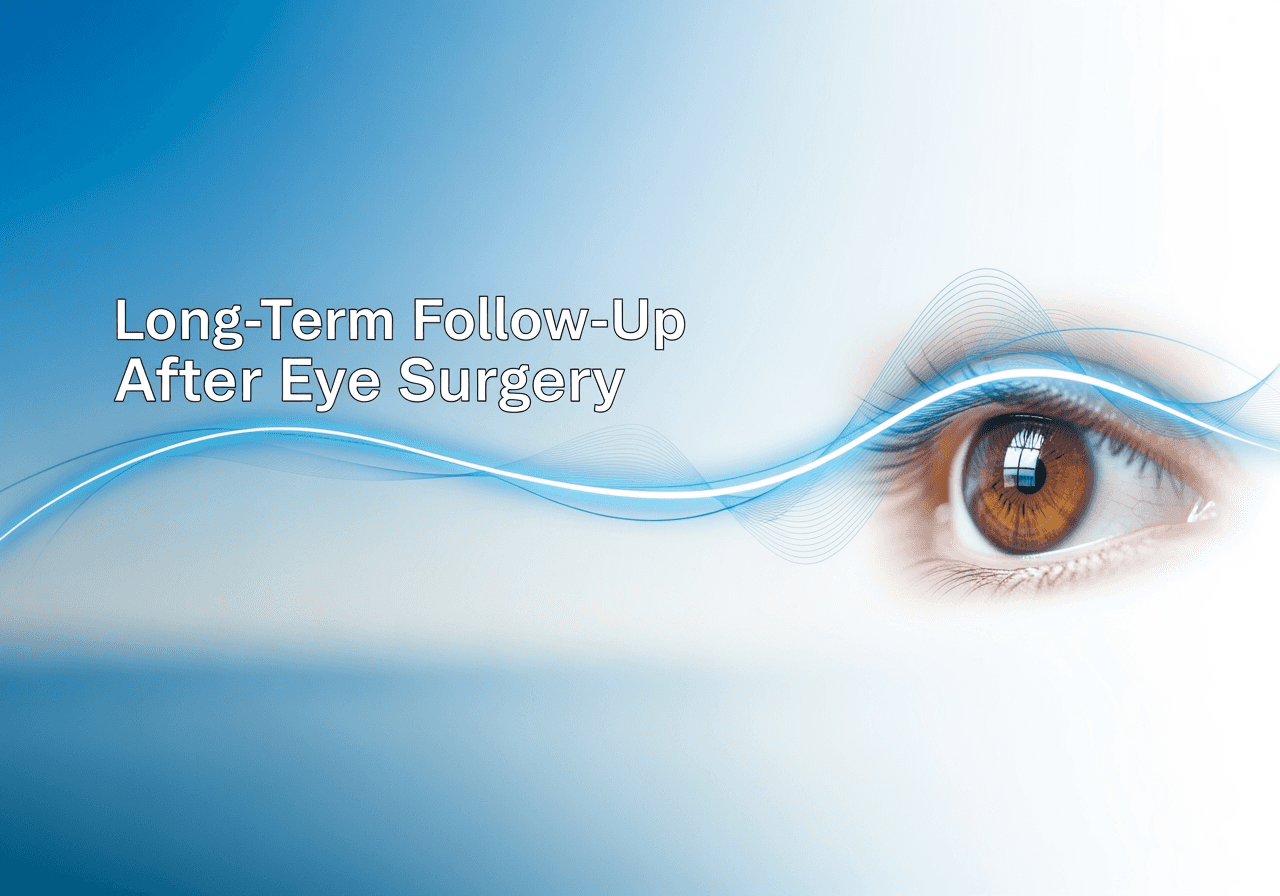
Long-Term Follow-Up After Eye Surgery
31 Oct, 2025
 Healthtrip
Healthtrip- Why is Long-Term Follow-Up Crucial After Eye Surgery?
- Who Needs Long-Term Follow-Up and What Conditions Warrant It?
- Where Can You Get Long-Term Eye Surgery Follow-Up Care?
- Breyer, Kaymak & Klabe Augenchirurgie, Germany
- Helios Klinikum Erfurt, Germany
- Vejthani Hospital, Thailand
- Yanhee International Hospital, Thailand
- Memorial Sisli Hospital, Turkey
- Hisar Intercontinental Hospital, Turkey
- Eyesite Eyecare Centres, United Kingdom
- Real Clinic, United Kingdom
- Saudi German Hospital Alexandria, Egypt
- Taoufik Clinic, Tunisia
- Pantai Hospital Kuala Lumpur, Malaysia
- How Does Long-Term Follow-Up Work? (Tests and Procedures)
- Potential Long-Term Complications and How Follow-Up Helps Mitigate Them
- Examples of Successful Long-Term Follow-Up and Improved Outcomes < li>Conclusion: The Value of Ongoing Eye Care
Understanding the Importance of Long-Term Follow-Up
Long-term follow-up after eye surgery is much more than just attending scheduled appointments; it's a proactive approach to safeguarding your vision for years to come. It involves consistent monitoring, early detection of potential complications, and personalized care tailored to your specific needs. Imagine you've just had LASIK surgery at Breyer, Kaymak & Klabe Augenchirurgie in Düsseldorf and are thrilled with your improved vision. However, without regular check-ups, subtle changes in your vision or early signs of dry eye might go unnoticed, potentially leading to discomfort or even vision regression. These follow-up visits allow your ophthalmologist, perhaps one affiliated with the Healthtrip network, to assess the overall health of your eyes, check for any signs of infection, inflammation, or other complications, and adjust your treatment plan as needed. This proactive approach allows for timely intervention, preventing minor issues from escalating into more serious problems that could compromise your vision. It’s like having a dedicated team, accessible through Healthtrip, always on the lookout for anything that could affect your eye health. Remember, your eyes are precious, and investing in long-term follow-up care is an investment in your future vision and overall well-being.
Most popular procedures in India
Common Eye Surgeries and Their Specific Follow-Up Needs
Different eye surgeries come with unique follow-up requirements. For instance, cataract surgery, a common procedure performed at places like Yanhee International Hospital in Bangkok, often requires regular check-ups to monitor for posterior capsule opacification (PCO), a clouding of the lens capsule that can occur months or even years after surgery. This can usually be easily corrected with a quick laser procedure. Glaucoma surgery, on the other hand, needs careful monitoring of eye pressure to ensure the treatment is effectively preventing further optic nerve damage. Procedures like LASIK, offered at some clinics partnering with Healthtrip, necessitate monitoring for dry eye, corneal ectasia, or other refractive changes. Retinal surgeries, such as those for retinal detachment, often demand frequent examinations to ensure the retina remains attached and to detect any signs of scar tissue formation. The specific follow-up schedule and tests will vary depending on the type of surgery you've had and your individual risk factors. Your ophthalmologist at hospitals like Saudi German Hospital Alexandria, Egypt, will create a personalized plan tailored to your unique needs. Healthtrip ensures you're connected with specialists who provide comprehensive post-operative care, ensuring your recovery is smooth and your vision remains clear.
Wellness Treatments
Give yourself the time to relax
Lowest Prices Guaranteed!

Lowest Prices Guaranteed!
What to Expect During Follow-Up Appointments
Follow-up appointments after eye surgery are designed to closely monitor your progress and ensure your eyes are healing as expected. At a typical appointment, which might be scheduled through Healthtrip with a specialist at Memorial Sisli Hospital in Istanbul, you can expect a thorough eye exam. This usually includes a visual acuity test to check your vision, a refraction to determine if you need glasses or adjustments to your current prescription, and a slit-lamp examination to assess the overall health of your cornea, lens, and other eye structures. Your ophthalmologist might also check your eye pressure to screen for glaucoma and examine your retina to rule out any potential problems. In some cases, additional tests, such as optical coherence tomography (OCT) or corneal topography, may be performed to assess specific aspects of your eye health in more detail. It's also an excellent opportunity to discuss any concerns or symptoms you may be experiencing, such as dry eye, blurry vision, or halos around lights. Don't hesitate to ask questions! Your doctor is there to provide you with information, support, and guidance throughout your recovery process. Healthtrip can assist in scheduling these appointments and ensuring you receive the necessary care and attention.
Potential Complications and How to Detect Them Early
While eye surgery is generally safe and effective, potential complications can arise, even months or years after the procedure. Being aware of these risks and knowing how to detect them early is crucial for preserving your vision. Common complications include infection, inflammation, dry eye, glaucoma, cataract formation (after certain procedures), and retinal detachment. Symptoms to watch out for include persistent redness, pain, decreased vision, flashes of light, floaters, halos around lights, and double vision. If you experience any of these symptoms, it's important to contact your ophthalmologist immediately, even if you feel the symptoms are minor. Early detection and treatment can often prevent these complications from causing long-term damage. Regular follow-up appointments, arranged through Healthtrip with trusted professionals at hospitals like NMC Specialty Hospital, Al Nahda, Dubai, are essential for identifying potential problems early on. Your doctor will be able to detect subtle changes in your eye health that you might not notice yourself. Remember, proactive monitoring and prompt treatment are your best defenses against vision-threatening complications. Healthtrip can help you connect with specialists who can provide the necessary care and monitoring.
Lifestyle Adjustments and Home Care Tips
In addition to regular follow-up appointments, certain lifestyle adjustments and home care practices can significantly contribute to the long-term success of your eye surgery. Protecting your eyes from excessive sunlight by wearing sunglasses with UV protection is crucial, especially after procedures like cataract surgery. Maintaining good hygiene by washing your hands frequently and avoiding rubbing your eyes can help prevent infection. If you experience dry eye, using artificial tears as recommended by your doctor at places like Taoufik Clinic, Tunisia, can provide relief and prevent corneal damage. Maintaining a healthy diet rich in antioxidants and omega-3 fatty acids can also promote overall eye health. If you spend a lot of time looking at screens, remember to take frequent breaks to rest your eyes and prevent eye strain. Avoiding smoking is also vital, as it can increase the risk of various eye diseases. Following your doctor's instructions carefully regarding medication and activity restrictions is also essential. Healthtrip can connect you with resources and specialists who can provide personalized advice on lifestyle adjustments and home care practices to support your long-term eye health. These small changes can make a big difference in maintaining the benefits of your eye surgery for years to come. Even if you had your surgery at Fortis Escorts Heart Institute, it’s important to have a long-term plan.
The Role of Technology in Long-Term Monitoring
Advancements in technology are revolutionizing long-term eye care, allowing for more precise and convenient monitoring of your eye health. Telemedicine, for example, enables remote consultations and monitoring, allowing you to connect with your ophthalmologist from the comfort of your home, which is a service that Healthtrip can support. This is particularly beneficial for patients who live in remote areas or have mobility issues. Advanced imaging techniques, such as optical coherence tomography (OCT) and fundus photography, provide detailed images of your eye structures, allowing for early detection of subtle changes that may indicate a problem. Artificial intelligence (AI) is also playing an increasingly important role in analyzing these images and identifying potential abnormalities. Wearable devices, such as smart glasses, are being developed to monitor various aspects of eye health, such as eye pressure and visual field. These technologies offer the potential to personalize and optimize long-term eye care, leading to better outcomes for patients. Healthtrip is committed to staying at the forefront of these technological advancements and connecting you with healthcare providers, perhaps at Singapore General Hospital, who utilize the latest tools and techniques to ensure the best possible care.
Finding the Right Specialist and Care Plan with Healthtrip
Navigating the world of eye care can be overwhelming, especially when it comes to finding the right specialist and developing a personalized long-term care plan. That's where Healthtrip comes in. We understand that every patient is unique, and we're dedicated to connecting you with experienced and reputable ophthalmologists who can provide the best possible care tailored to your specific needs. Whether you're seeking a second opinion, need assistance with scheduling follow-up appointments at places like Quironsalud Hospital Murcia, or require guidance on managing a specific eye condition, Healthtrip is here to help. We offer a comprehensive platform that allows you to search for specialists based on their expertise, location, and patient reviews. We also provide valuable information on various eye conditions and treatments, empowering you to make informed decisions about your health. Our team of dedicated care coordinators is available to assist you every step of the way, ensuring a smooth and stress-free experience. With Healthtrip, you can rest assured that you're receiving the highest quality care and support for your long-term eye health. Take control of your vision today and let Healthtrip guide you on your journey to a brighter future. No matter if you had your surgery at The Royal Marsden Private Care, London, Healthtrip is determined to provide the best long-term care.
Why is Long-Term Follow-Up Crucial After Eye Surgery?
Embarking on eye surgery is a significant decision, a journey towards clearer vision and an improved quality of life. But the journey doesn't end when you leave the operating room. Think of it as planting a tree; the initial planting is crucial, but the ongoing care, nurturing, and protection are what ensure it grows strong and healthy. Long-term follow-up care after eye surgery is that essential ongoing care, playing a pivotal role in safeguarding your vision and ensuring the lasting success of your procedure. It's about more than just checking if your eyesight is better; it's about monitoring the overall health of your eyes, detecting potential complications early on, and addressing them promptly before they escalate into serious problems that could compromise your vision. This proactive approach is the cornerstone of preserving the positive outcomes you've invested in through surgery. We at Healthtrip understand that your vision is priceless, and we are committed to connecting you with the best possible care, both during and after your eye surgery, ensuring a smooth and worry-free experience.
Imagine undergoing a successful cataract surgery, only to develop a secondary cataract months later. Without regular follow-up appointments, this condition might go unnoticed, gradually blurring your vision once again. Similarly, after refractive surgery like LASIK, the cornea might undergo subtle changes over time, potentially leading to regression or other issues. Regular check-ups allow your ophthalmologist to identify these changes early and implement corrective measures to maintain your corrected vision. Moreover, some eye surgeries can increase the risk of developing conditions like glaucoma or retinal detachment in the long run. Long-term follow-up provides an opportunity to monitor for these potential complications and initiate timely treatment to prevent vision loss. Think of it as having a vigilant guardian watching over your eyes, ensuring they remain healthy and clear for years to come. Healthtrip is here to guide you in finding the right specialists and facilities for your post-operative care, ensuring you receive the diligent monitoring your eyes deserve.
The peace of mind that comes with knowing your eyes are being carefully monitored is invaluable. It allows you to fully enjoy the benefits of your surgery without the constant worry of potential problems lurking in the background. Long-term follow-up isn't just about preventing complications; it's also about optimizing your visual outcomes. Your ophthalmologist can provide guidance on lifestyle modifications, prescribe appropriate eye drops, and offer personalized advice to help you maintain optimal eye health. They can also address any concerns or questions you may have, providing reassurance and empowering you to take an active role in your eye care. This collaborative approach between you and your eye care professional is essential for achieving the best possible long-term results. Healthtrip believes in empowering patients with information and access to quality care, ensuring you feel confident and supported throughout your entire eye surgery journey, from the initial consultation to the long-term follow-up.
Who Needs Long-Term Follow-Up and What Conditions Warrant It?
While long-term follow-up is beneficial for anyone who has undergone eye surgery, it's particularly crucial for individuals who have certain pre-existing conditions or have undergone specific types of procedures. Think of it as tailoring a suit; while a general fit might work for some, others require more precise adjustments to ensure optimal comfort and style. Similarly, certain eye conditions and surgeries necessitate more vigilant long-term monitoring to ensure the best possible outcomes. Patients with a history of glaucoma, for instance, require regular eye exams to monitor their intraocular pressure and detect any signs of disease progression. Even if their glaucoma is well-controlled before surgery, the procedure itself can sometimes affect their eye pressure, making ongoing monitoring essential. Similarly, individuals with diabetes are at a higher risk of developing diabetic retinopathy, a condition that can damage the blood vessels in the retina. After eye surgery, these patients need close monitoring to ensure that their diabetic retinopathy doesn't worsen or lead to other complications.
Specific types of eye surgeries also warrant more diligent long-term follow-up. For example, patients who have undergone refractive surgeries like LASIK or PRK should have regular check-ups to monitor for corneal ectasia, a rare but serious condition in which the cornea gradually thins and bulges outward, potentially distorting vision. While these procedures are generally safe and effective, the long-term effects on the cornea need to be carefully monitored to ensure stability. Cataract surgery, too, requires ongoing follow-up to monitor for posterior capsule opacification (PCO), also known as a secondary cataract, where the lens capsule behind the implanted lens becomes cloudy, blurring vision. This is a common complication that can be easily treated with a quick laser procedure. Furthermore, those who have had surgery for retinal detachment or macular degeneration need particularly close monitoring due to the potential for recurrence or progression of these conditions. Healthtrip understands the unique needs of each patient and can connect you with specialists experienced in managing specific post-operative conditions, ensuring you receive the personalized care you deserve.
It's important to remember that even if you don't have any pre-existing conditions or haven't undergone a high-risk procedure, long-term follow-up is still a valuable investment in your eye health. Our eyes change as we age, and regular eye exams can help detect age-related conditions like cataracts, glaucoma, and macular degeneration in their early stages, when they are most treatable. These conditions can develop gradually and often without noticeable symptoms, making regular check-ups essential for early detection and intervention. Long-term follow-up also provides an opportunity to address any concerns you may have about your vision, such as dry eye, eye strain, or blurry vision. Your ophthalmologist can recommend appropriate treatments and lifestyle modifications to improve your comfort and visual performance. Healthtrip is committed to promoting proactive eye care, empowering you to take control of your vision health and enjoy clear, comfortable vision for years to come. We can connect you with reputable eye care facilities like Breyer, Kaymak & Klabe Augenchirurgie in Germany and Saudi German Hospital Alexandria, Egypt, ensuring access to quality long-term care, wherever you are in the world.
Where Can You Get Long-Term Eye Surgery Follow-Up Care?
Finding the right place for long-term eye surgery follow-up care is just as important as selecting the right surgeon for the initial procedure. It's about establishing a relationship with a trusted eye care professional who understands your specific needs and can provide consistent, high-quality care over the long term. You want a place that not only has the necessary equipment and expertise but also values patient communication and provides a comfortable, supportive environment. Fortunately, there are many excellent eye care facilities around the world that specialize in long-term follow-up care, offering a wide range of services to meet your individual needs. The best option for you will depend on your location, insurance coverage, and specific medical requirements. Healthtrip is here to help you navigate these choices and connect you with the most suitable options for your post-operative care. We understand that choosing a healthcare provider can be overwhelming, and we are dedicated to simplifying the process and ensuring you receive the best possible care.
Many hospitals and clinics that perform eye surgery also offer comprehensive long-term follow-up programs. These programs typically include regular eye exams, diagnostic testing, and consultations with ophthalmologists or optometrists. Some of these facilities also have specialized clinics for specific conditions, such as glaucoma or macular degeneration, providing targeted care for patients with these complex eye diseases. For example, Vejthani Hospital and Yanhee International Hospital in Thailand are renowned for their comprehensive eye care services, including advanced diagnostic testing and treatments for a wide range of eye conditions. Similarly, Memorial Sisli Hospital and Hisar Intercontinental Hospital in Turkey offer state-of-the-art facilities and experienced ophthalmologists who can provide expert long-term follow-up care. In the United Kingdom, Eyesite Eyecare Centres and Real Clinic are excellent choices for routine eye exams and specialized consultations, ensuring you receive personalized attention and comprehensive care. Whether you're looking for a large, multi-specialty hospital or a smaller, more intimate clinic, Healthtrip can help you find the perfect fit for your needs.
In addition to hospitals and clinics, there are also many private ophthalmology practices that offer long-term follow-up care. These practices often provide a more personalized and intimate setting, allowing you to develop a strong relationship with your eye care provider. Many ophthalmologists have a special interest in specific areas of eye care, such as glaucoma, cataracts, or retina, and can provide expert care for patients with these conditions. For example, Saudi German Hospital Alexandria, Egypt is known for its experienced ophthalmologists and state-of-the-art facilities. Likewise, for patients in Tunisia, Taoufik Clinic offers comprehensive eye care services with a focus on personalized attention. If you are in Malaysia, Pantai Hospital Kuala Lumpur provides a wide range of eye care services, including long-term follow-up care for various eye conditions. Healthtrip works with a network of trusted eye care professionals around the world, ensuring that you have access to the best possible care, no matter where you are. We can help you find an ophthalmologist who is not only highly qualified but also a good fit for your personality and preferences, ensuring a comfortable and positive experience. Our goal is to make your eye care journey as seamless and stress-free as possible, from the initial consultation to the long-term follow-up.
Also Read:
How Does Long-Term Follow-Up Work? (Tests and Procedures)
So, you've had your eye surgery – congratulations! You're seeing clearer, feeling better, and ready to take on the world (or at least read the menu without squinting). But here's the thing: your journey with your eyes isn’t quite over. Long-term follow-up care is like the steady hand guiding a ship safely into harbor. It’s not just about checking if everything's still in place; it’s about proactively monitoring your vision for any subtle changes that might indicate a potential issue down the road. It's about ensuring that your eyes remain healthy and your vision remains sharp for years to come. Think of it as an investment in your long-term visual happiness, rather than a one-time fix, long-term follow-up is about building a relationship with your eye care team. This allows them to become intimately familiar with your eye's unique history and to spot any changes that might otherwise go unnoticed. Regular check-ups provide an opportunity to address any questions or concerns you may have about your vision or eye health, empowering you to take an active role in maintaining your eyesight. Through Healthtrip, you can access comprehensive aftercare packages that include these crucial follow-up appointments, ensuring continuity of care wherever you are in the world.
Routine Eye Exams: The Cornerstone of Follow-Up
Regular eye exams are the bread and butter of long-term follow-up. These aren't your average vision tests. They involve a comprehensive assessment of your eye health, including visual acuity (how well you see), refraction (checking your prescription), eye pressure measurement (to screen for glaucoma), and a detailed examination of the retina and optic nerve. These tests help your doctor establish a baseline and track any changes over time. If you've had cataract surgery, for example, your doctor will be looking for signs of posterior capsule opacification (PCO), a common condition where the lens capsule becomes cloudy, affecting your vision. If you've had refractive surgery like LASIK, they'll be monitoring for regression (a return of your original prescription) or dry eye. If you've had glaucoma surgery, they'll be tracking your eye pressure to ensure it remains within a safe range. These exams are particularly important for individuals who have undergone more complex procedures or have pre-existing eye conditions. They provide an opportunity for early detection and intervention, preventing potentially serious complications. Healthtrip partners with top-tier eye clinics worldwide, such as Breyer, Kaymak & Klabe Augenchirurgie in Germany, ensuring access to state-of-the-art diagnostic equipment and experienced ophthalmologists to conduct these crucial examinations.
Specialized Tests for In-Depth Analysis
Sometimes, routine exams aren't enough to get the full picture. That's where specialized tests come in. These tests provide a more in-depth analysis of specific aspects of your eye health. Optical coherence tomography (OCT) is a non-invasive imaging technique that provides detailed cross-sectional images of the retina, optic nerve, and cornea. It's invaluable for detecting subtle changes associated with glaucoma, macular degeneration, and diabetic retinopathy. Visual field testing measures your peripheral vision and can help detect early signs of glaucoma or other neurological conditions. Corneal topography maps the surface of the cornea, allowing doctors to assess its shape and identify any irregularities that might affect vision, especially after refractive surgery. Fluorescein angiography involves injecting a dye into your bloodstream and taking pictures of the blood vessels in your retina. It's used to diagnose and monitor a variety of retinal conditions, such as diabetic retinopathy and macular degeneration. Gonioscopy is a procedure used to examine the drainage angle of the eye, which is important for diagnosing and managing glaucoma. These specialized tests are like having a high-powered microscope for your eyes, allowing your doctor to see things that wouldn't be visible with a standard exam. Healthtrip connects patients with hospitals equipped with these advanced diagnostic tools, such as Vejthani Hospital in Thailand and Memorial Sisli Hospital in Turkey, ensuring comprehensive evaluation and personalized care.
Also Read:
Potential Long-Term Complications and How Follow-Up Helps Mitigate Them
Okay, let's be real for a moment. Eye surgery, like any medical procedure, isn't without its potential risks. While the vast majority of surgeries are successful, there's always a chance of complications arising, either immediately after the procedure or even years down the road. But don't panic! That's precisely why long-term follow-up is so important. Those regular check-ups aren't just about patting you on the back and saying, "Looking good!" They're about proactively searching for any signs of trouble and nipping them in the bud before they become major problems. Think of it as having a vigilant guardian watching over your vision, ready to sound the alarm at the first hint of danger. Complications can range from relatively minor annoyances to more serious conditions that can threaten your vision. The key is early detection, and that's where consistent follow-up care makes all the difference. Healthtrip focuses on connecting you with healthcare providers who prioritize preventative care and have the expertise to manage potential complications effectively, giving you peace of mind knowing your vision is in capable hands.
Addressing Common Post-Surgical Issues
One of the most common issues following eye surgery, particularly refractive surgeries like LASIK or PRK, is dry eye. While often temporary, it can become chronic in some cases. Long-term follow-up allows your doctor to monitor the severity of your dry eye and recommend appropriate treatments, such as artificial tears, prescription eye drops, or even punctal plugs, to keep your eyes comfortable and your vision clear. Another potential complication after cataract surgery is posterior capsule opacification (PCO), also known as a "secondary cataract." This occurs when the lens capsule, which supports the artificial lens implant, becomes cloudy, causing blurred vision. Fortunately, PCO is easily treated with a quick and painless laser procedure called a YAG capsulotomy. Regular follow-up exams will allow your doctor to detect PCO early and restore your clear vision. For those who have undergone glaucoma surgery, monitoring eye pressure is crucial. Elevated eye pressure can damage the optic nerve and lead to vision loss. Your doctor will regularly check your eye pressure and adjust your medication or recommend further treatment if needed. These are just a few examples of the common post-surgical issues that can be effectively managed with long-term follow-up care. Healthtrip can help you find specialists in facilities such as Saudi German Hospital Alexandria in Egypt or Yanhee International Hospital in Thailand, experienced in managing these specific post-operative concerns.
Minimizing the Impact of Rare but Serious Complications
While rare, some eye surgery complications can be more serious and require prompt intervention. Infection, for example, is a potential risk after any surgery. Although rare with modern techniques and sterile environments, early detection and treatment with antibiotics are crucial to prevent vision loss. Retinal detachment, where the retina separates from the back of the eye, is another serious complication that can occur after certain types of eye surgery, especially cataract surgery. Symptoms include a sudden increase in floaters, flashes of light, or a shadow in your peripheral vision. If you experience these symptoms, it's essential to seek immediate medical attention. Macular degeneration, a leading cause of vision loss in older adults, can sometimes be exacerbated by eye surgery, although this is not a direct cause-and-effect relationship. Regular monitoring allows for early detection and management with medications or other treatments to slow the progression of the disease. By diligently monitoring your eye health and promptly addressing any concerning symptoms, you can significantly reduce the risk of long-term vision loss from potential complications. Regular check-ups at facilities like Helios Klinikum Erfurt in Germany, facilitated by Healthtrip, can make a significant difference in preserving your eyesight for years to come.
Also Read:
Examples of Successful Long-Term Follow-Up and Improved Outcomes
Let's talk about some real-life scenarios where consistent long-term follow-up truly made a difference. These stories aren't just feel-good anecdotes; they highlight the tangible benefits of proactive eye care and underscore the importance of making follow-up a priority. These examples showcase how early detection, timely intervention, and a strong doctor-patient relationship can lead to improved outcomes and preserved vision. They demonstrate why long-term follow-up isn't just a recommendation, but a vital component of successful eye surgery. These are the types of outcomes Healthtrip strives to facilitate by connecting patients with dedicated healthcare professionals and comprehensive aftercare programs. These stories can instill hope and empower individuals to take control of their eye health, understanding that their journey to clear vision extends far beyond the operating room.
Case Study 1: Preventing Vision Loss from Glaucoma
Imagine a patient who underwent glaucoma surgery to lower their eye pressure. Initially, everything seemed fine, and their vision was stable. However, without regular follow-up, their eye pressure could have slowly crept back up over time, silently damaging their optic nerve and leading to irreversible vision loss. Fortunately, this patient diligently attended their follow-up appointments. During one of these appointments, their doctor noticed a slight increase in eye pressure. Because the increase was detected early, the doctor was able to adjust their medication and prevent any further damage to the optic nerve. As a result, the patient's vision remained stable, and they were able to maintain their quality of life. This case illustrates the critical role of long-term follow-up in managing chronic conditions like glaucoma. Regular monitoring allows for timely adjustments to treatment, preventing progressive vision loss. Healthtrip can assist patients in finding reputable eye clinics, such as Breyer, Kaymak & Klabe Augenchirurgie that specialize in glaucoma management and provide comprehensive follow-up care.
Case Study 2: Managing Dry Eye After LASIK and Enhancing Comfort
Another example involves a patient who had LASIK surgery to correct their vision. While the surgery was successful in improving their eyesight, they experienced persistent dry eye symptoms, such as burning, stinging, and blurry vision. These symptoms significantly impacted their daily life and made it difficult to enjoy activities like reading or working on the computer. Through regular follow-up appointments, their doctor was able to identify the underlying causes of their dry eye and recommend a personalized treatment plan. This plan included artificial tears, prescription eye drops, and lifestyle modifications, such as using a humidifier and taking frequent breaks from screen time. Over time, the patient's dry eye symptoms improved significantly, and they were able to enjoy clear and comfortable vision once again. This case highlights the importance of addressing post-surgical side effects and tailoring treatment to individual needs. Long-term follow-up allows for ongoing management of dry eye, ensuring optimal comfort and visual performance. With Healthtrip, you can locate clinics like Eyesite Eyecare Centres in the United Kingdom that provide specialized dry eye management services and prioritize patient comfort.
Case Study 3: Early Detection and Treatment of Retinal Detachment
Consider a patient who had cataract surgery and, a few years later, began experiencing a sudden increase in floaters and flashes of light in their vision. Recognizing these symptoms as potential signs of retinal detachment, they immediately contacted their ophthalmologist. During an emergency examination, a small retinal detachment was detected. Thanks to the prompt diagnosis, the patient was able to undergo timely treatment to reattach the retina and prevent permanent vision loss. This case demonstrates the importance of patient education and awareness of potential complications. Long-term follow-up includes educating patients about warning signs and encouraging them to seek immediate medical attention if they experience any concerning symptoms. Early detection and treatment of retinal detachment can significantly improve outcomes and preserve vision. Healthtrip strives to connect patients with facilities equipped to handle emergencies, such as Yanhee International Hospital in Thailand, ensuring access to timely and effective care.
Also Read:
Conclusion: The Value of Ongoing Eye Care
In conclusion, think of long-term eye surgery follow-up as an investment – not just in your vision, but in your overall quality of life. It's about building a lasting relationship with your eye care team, proactively monitoring your eye health, and addressing any potential issues before they impact your vision. It allows them to become intimately familiar with your unique visual history and to spot any changes that might otherwise go unnoticed. Think of it as having a vigilant guardian watching over your sight for a better and brighter future. It's about taking control of your vision and ensuring that you can continue to enjoy clear, comfortable sight for years to come. Healthtrip understands the importance of ongoing eye care and is committed to connecting you with the resources and support you need to maintain optimal vision after surgery. From finding the right specialists to accessing comprehensive aftercare packages, Healthtrip is your partner in long-term visual wellness.
Related Blogs

Healthtrip’s Transparency in Eye Surgery Pricing and Packages
Detailed insights into eye surgery – doctors, hospitals, technology, recovery,
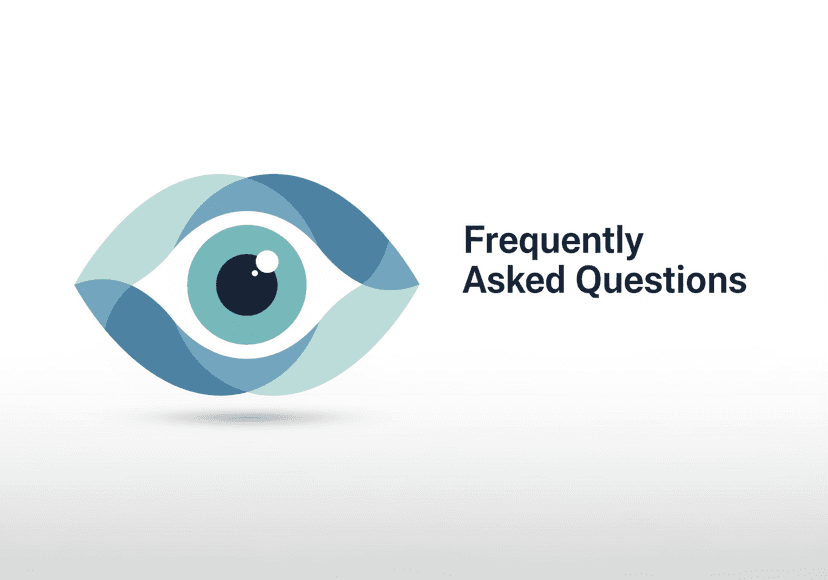
Frequently Asked Questions About Eye Surgery
Detailed insights into eye surgery – doctors, hospitals, technology, recovery,

Advanced Robotic Technology Used in Eye Surgery
Detailed insights into eye surgery – doctors, hospitals, technology, recovery,
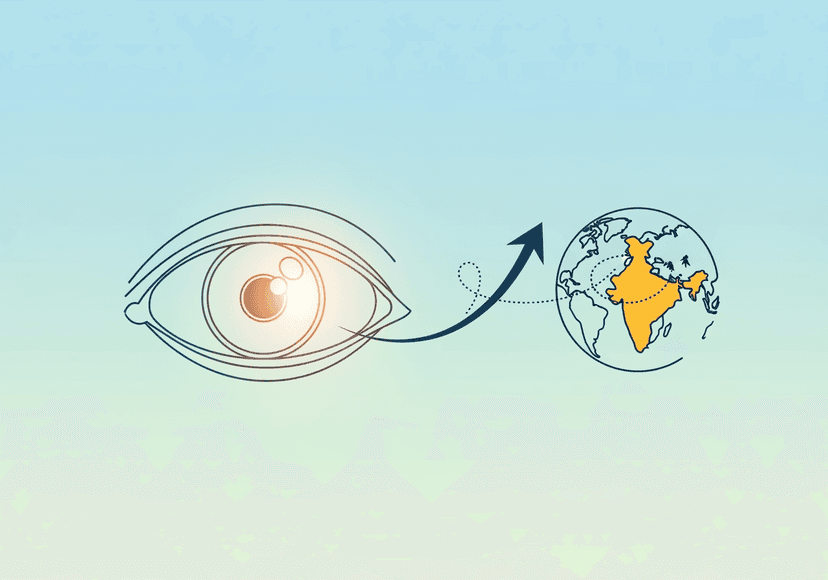
How Healthtrip Supports Foreign Patients for Eye Surgery in India
Detailed insights into eye surgery – doctors, hospitals, technology, recovery,
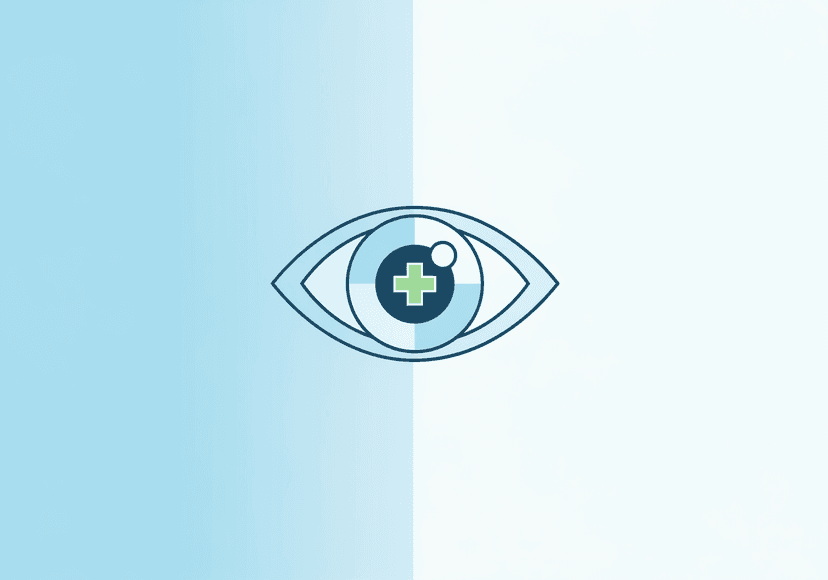
Top Medical Packages for Eye Surgery Offered by Healthtrip
Detailed insights into eye surgery – doctors, hospitals, technology, recovery,
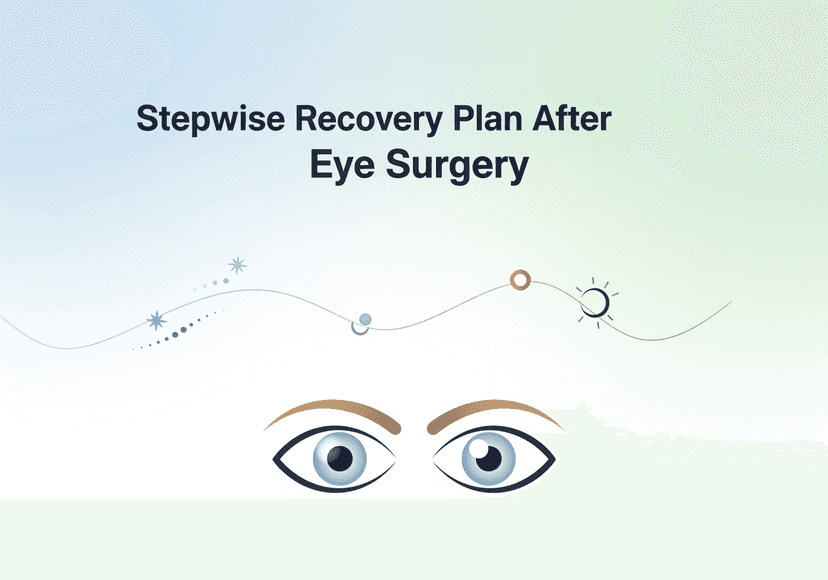
Stepwise Recovery Plan After Eye Surgery
Detailed insights into eye surgery – doctors, hospitals, technology, recovery,










